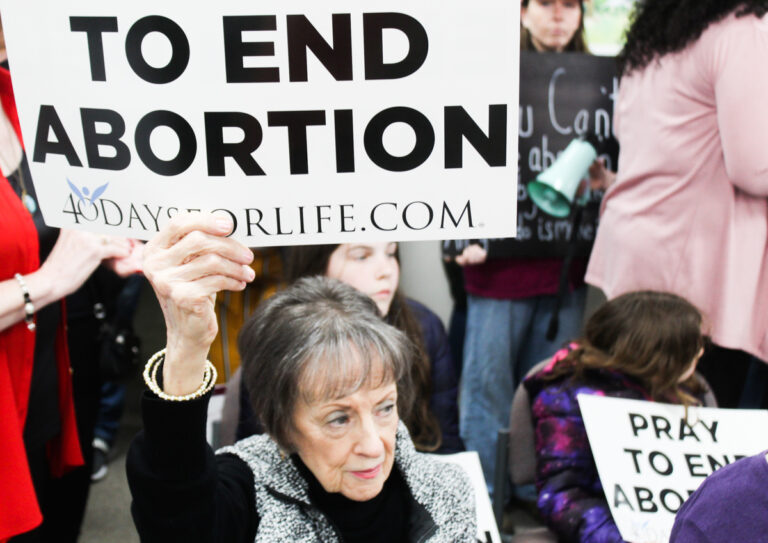DANVILLE – The Danville City Council narrowly passed an ordinance outlawing the shipping of abortion medication and tools used to perform abortions Tuesday night.
Now, Danville is wielding legal threats from the ACLU of Illinois and Illinois Attorney General Kwame Raoul. But, many aldermen voted in spite of these threats, citing their moral convictions.
“If I thought for one minute, my vote would end an infant’s life I could not live with myself,” Danville Alderman Sharon Pickering said. “How can I put a dollar amount on life? I can’t and I won’t.”
At the meeting, the council amended the ordinance in an attempt to shield the city from legal challenges. The amended ordinance will only go into effect after the city “obtains a declaratory judgment from a court.”
Tensions were high at the meeting where hundreds of abortion rights advocates and abortion rights opponents protested inside the council chambers for more than two hours before the meeting began.

The ACLU of Illinois threatened to sue the city if they passed the ordinance last week. The ordinance clearly violates both state law and the Reproductive Health Act, said Chaundre White, a senior supervising attorney with the ACLU of Illinois.
“The city of Danville is not free to ignore that law and pass its own ordinance that is illegal and that is something that we will litigate in court,” White said.
Illinois’ Reproductive Health Act guarantees the right to make choices about reproductive healthcare — including having an abortion.
Illinois Attorney General Kwame Raoul sent a letter to Danville Mayor Rickey Williams Jr. warning the proposed ordinance violated state law.
“Illinois law could not be clearer,” Raoul wrote, “Our state is a proud safe haven for access to reproductive health care that respects bodily autonomy and fundamental rights.”
“I will continue to stand up for the rights of everyone in Illinois to access reproductive health care, and my office stands ready to take appropriate action to uphold Illinois law.”
Many aldermen disregarded the opinion of James Simon, the attorney for the council, who said these decisions are ultimately up to the city of Illinois.
“I do not believe under Illinois law or federal law, that this ordinance is legal,” Simon said.
Widespread Consequences
But the ordinance could affect more than just women seeking an abortion in Danville, speakers at the meeting said.
The ordinance might also violate the Illinois Pharmacy Practice Act, according to Garth Reynolds, the executive director of the Illinois Pharmacist Association.
“Municipalities have tried to regulate pharmacies before,” Reynolds said. “And it’s been found to be inappropriate.”
Medical professionals — from OBGYN physicians to midwives — said many of the medications the ordinance could apply to are used to treat many health issues, from arthritis to postpartum hemorrhage.
“These are drugs that are used every day, at the hospital, in our clinics, and not every day, but in my practice,” Hannah Landis, a local midwife, said. “They are medications that I carry in my mobile clinic, as I go out serving moms in the hope that I don’t have to use them.”

Danville Alderman Tricia Teague said the abortion medications affected under the ordinance are also used to treat other health issues — one of which she’s had.
“So if I get these drugs, because I had another fibroid procedure, because they keep growing back, then I would be in violation,” Teague said.
According to the Mayo Clinic, uterine fibroids are noncancerous growths of the uterus that often appear during childbearing years. In extreme cases, multiple fibroids can expand the uterus so much that it reaches the rib cage and can add weight.
Nationwide Challenges
Other states have tried to pass similar city ordinances restricting abortion by banning the shipment of materials.
New Mexico Attorney General Raúl Torrez is now suing two counties and two cities that passed ordinances outlawing the shipping of abortion tools and medication, mirroring Danville’s ordinance.
This ordinance had been in the works since city officials announced an Indiana abortion provider had purchased a property in Danville. Mark Lee Dickson, an anti-abortion rights activist, spoke at a protest against the proposed abortion clinic in Danville one month ago.
At the protest, Dickson warned an ordinance like this was coming.
“You can expect to see an ordinance, which would require compliance with some federal statutes, which would not allow this abortion facility to receive abortion-inducing drugs and abortion paraphernalia at this location, effectively keeping abortion out of Danville,” Dickson said.
The future of abortion in Danville
For now, Danville doesn’t have an abortion clinic or an abortion restriction.
That could all change if a court rules the ordinance is lawful. Mayor Rickey Williams Jr. says the ordinance would be enforced by local law enforcement which would operate off of tips from the community.

But, that’s drawn concerns over privacy and how it would be enforced from ACLU lawyer Chaundre White.
“Proposing an unenforceable ordinance is a political maneuver that causes confusion and that harms people seeking care,” White said.
Caylynne Dobbles, a Danville resident, organized a protest against the ordinance and in favor of abortion rights. She’s a co-founder of the Vermilion County Pride Coalition.
After the protest, Dobbles said she was disappointed by how the officials she elected voted.
“These are people that I’ve voted for, my neighbors, my people in my community,” she said. “Just to know that they don’t support my right and my right to choose what I do with my own body — it’s pretty sad.”
However, this decision could be the momentum Mary Catherine Roberson, the field director of Democratic Congresswoman Robin Kelly’s Danville office, has been looking for.
“This energy that I’ve seen mobilized around this issue will not die,” Roberson said. “It has been the political mobilization I’ve been thirsting for. We will stoke it.”
Farrah Anderson is a journalist and student at the University of Illinois. Follow her on Twitter @farrahsoa.

